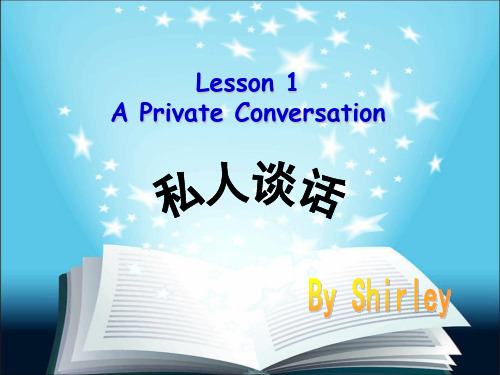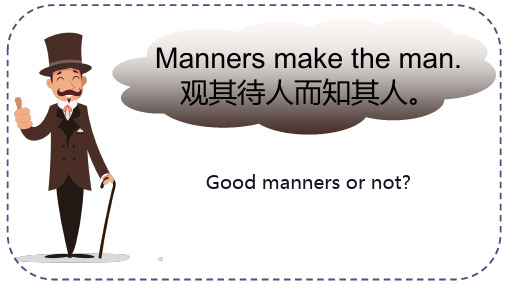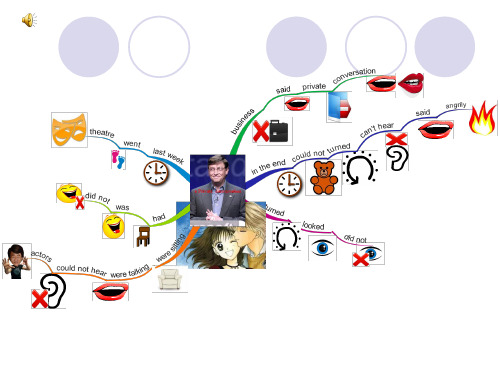新概念第二册 Lesson 1 讲义教师版
新概念第二册Lesson1 A private conversation详解

Lesson1 A private conversationprivate adj. 私人的conversation n. 谈话theatre n. 剧场,戏院seat n. 座位play n. 戏loudly adv. 大声地angry adj. 生气的angrily adv. 生气地attention n. 注意bear v. 容忍business n. 事rudely adv. 无礼地,粗鲁地Last week I went to the theatre. I had a very good seat. The play was very interesting. I did not enjoy it. A young man and a young woman were sitting behind me. They were talking loudly. I got very angry. I could not hear the actors. I turned round.I looked at the man and the woman angrily. They did not pay any attention. In the end, I could not bear it. I turned round again. "I can't hear a word!" I said angrily."It's none of your business," the young man said rudely. "This is a private conversation!"参考译文:上星期我去看戏. 我的座位很好, 戏很有意思, 但我却无法欣赏. 一青年男子与一青年女子坐在我的身后, 大声地说着话. 我非常生气, 因为我听不见演员在说什么. 我回过头去怒视着那一男一女, 他们却毫不理会. 最后, 我忍不住了, 又一次回过头去, 生气地说 : “我一个字也听不见了!”“不关你的事, “那男的毫不客气地说, “这是私人间的谈话!”美音:肯定I can否定I can't,它的/t/是吞进去的, 在读音上很难区别, 只能根据上下文来定The writer could not bear it. He could not ______ it.a. carryb. sufferc. standd. liftbear 忍受=standsuffer 遭受,忍受 (精神或肉体上)痛苦,suffer后面必须加一种痛苦I suffer the headache.(肉体上的痛苦)He often suffers defeat.(精神上的痛苦)(defeat n. 失败)单词:1 a.私人的:______________2 n.谈话:______________3 n.剧场,戏院:______________4 n.座位:______________5 n.戏:______________6ad.大声地:______________7a.生气的:______________8ad.生气地:______________9n.注意:______________10v.容忍:______________11n.事:______________12 ad.无礼地,粗鲁地:______________ 词组:默写课文:。
新概念英语第2册:lesson 1- lesson 12核心句型精讲

• 拓展提高:
【Unit 01 My classroom】
• how还可以接整句话表示感叹。
e.g. How I miss my old school!我真想念我的母校!
e.g. How I hate them! 我恨透了他们!
• 及时操练
答案
你真好!
How good you are!/What a good person you are!
【FUronmitt0he1re,Mheywcillal sflsyrotooPmer】th. 从那里, 他再飞往珀斯。
(经典原文:NCE2-L4) (He will soon visit Darwin. From there, he will fly to Perth.)
小贴示: 尽量用简洁的英语来表达意思。语言学中,简洁就 是美。(Brevity is beauty.) 复杂版本:He will go to Perth by plane.
(经典原文:NCE2-L8) 句型解析: 比较级 句子主干(含形容词或副词的比较级)+than + 比较对象 在形容词或副词比较级前面可以加上以下的词来具体修饰程度: far,much,a little, a bit,even等。
• 小贴士
【Unit 01 My classroom】
• 拓展提高
【Unit 01 My classroom】
匆匆忙忙去某地,可以将go to ...in a hurry
简化为:hurry to...
• 及时操练 就在那时,一名男子匆匆忙忙来到售票处。 Just then, a man hurried to the ticket office.
Pinhurst is only five【mUilnesitfr0o1m SMilbyucryla, sbsurt oMor.mS】cott cannot get a telephone for his new garage, so he has just bought twelve pigeons. 平赫特离锡尔伯里只有 5 英里, 但詹姆斯.斯科特先生未能为他新 的汽车修理部搞到一部电话机, 所以他买了只 鸽子.
新概念英语第二册Lesson1

Part4. Summary Writing 常见疑问句提问内容和回答方式 1. Where....: 询问地点。
回答时可以直接写地点或在句子末尾加地点。 2. Who..:询问人物
回答时可以给出人物名称 3. What...: 询问内容
回答时给出具体内容或者用名词回答 4. When...:询问时间
last month/year/morning/evening/night
Last week I went to the theatre. They watched a football game at home last night. He came to China last year. Last month my father bought a new car.
3. 表示动作状态的词语:多放在动词后 (副词) I said angrily. 我生气地说。 The young man said rudely. 那个年轻人粗鲁地说。
4. 描述人、事、物状态或特点的词语:多在名词前或be动词之后 (定语/表语) I got a very good seat. 我有一个好座位。/我的座位很好。(定语) The play was very interesting. 戏很有意思。(表语)
回答时可直接给出时间词语,或者在句子开头/末尾加入时间词语 5. How..:询问方式或状态
回答时给出表示方式的内容或者描述状态的形容词、副词等 6. 一般疑问句:用来确认是否属实
回答时:Yes,主语+疑问词肯定式。/No, 主语+疑问词否定式。
2. 表示动作的频率副词:在动词前 often, usually, always, sometimes, never, rarely She often walked to school when she was twelve years old. 在她十二岁的时候,她常常走着去上学。 He never made noise in the class before. 以前他从不在班里大声喧哗。 频率词组多在动词之后或者句末 once a day/week/month/year twice a day/week/month/year three times a day/week/month/year
新概念英语第二册Lesson1课件

I could not hear the actors.
Key structures and usage
过去进行时:过去某个时间正在进行 或发生的动作 A young and a young woman were sitting behind me.
They were talking loudly.
• • • • • • • • • • • • • • •
【Key structures】 简单陈述句的语序 陈述句一定是有主语,有动词,有宾语,有句号 6 1 2 3 4 5 6 when? Who? Action Who? How? Where? When? Which? Which? What? What? 1 ---主语,一般由名词、代词或名词短语构成,通常位于动词之前,动词必 须与主语一致,即主语决定动词的单复数形式 2 ---谓语,由动词充当 3 ---宾语,一般为名词、代词或名词短语 4 ---副词或介词短语,对方式或状态提问,往往做状语 I like her very much 5 ---地点状语,一般在方式副词之后,时间副词之前 6 ---时间状语,可以放在句首或句末 简单陈述句一定不能少的是主语, 谓语. 如果问何时何地,是一个固定搭配 when and where
• • • • • •
★business n. 事, 生意 ① n. 生意 business man :生意人 do business: 做生意 ② n. 某人自己的私人的事情 It's my business. (指私人的事, 自己处理的 事) • It's none of your business. 不关你的事。
Language points
以下短语中名词前不加冠词:
新概念英语第二册Lesson1完整课件

[v.]
seat
seat sb.
[n.]
让某人就坐
have a very good seat
= a very good place
视线无遮挡,所处的位置非常
好,而非椅子本身材料好。
take one's seat
business
1. 事情(私人的) It's none of my business.
adj. 私人的
private school 私立学校
private letter 私人信件
privacy/ˈprɪvəsi/ n.隐私
public adj. 公众的,公开的 public school 公立学校 public place 公众场所
angry
angry adj. 生气的 be angry with sb. 生某人的气 be angry at/about sth. 为某事而生气
interested adj. 对…感兴趣的 be interested in sth/ doing sth. I am interested in sports.
enjoy v.享受…之乐,欣赏,喜爱 enjoy doing sth. enjoy swimming 喜欢游泳 enjoy one's dinner 饭吃得津津有味 enjoy oneself 玩得开心 =have fun=have a good time
late----late far----far
Listening
Why did the writer complain to the people behind him?
Last week I went to the_t_h__e_a_t_r_e_. I had a very good__s_e_a_t_. The play was very interesting. I did not_e_n__j_o_y it. A young man and a young woman were sitting behind me. They were talking_l_o_u__d_l_y_. I got very__a_n_g__r_y_. I could not hear the actors. I turned round. I looked at the man and the woman_a__n_g__ri_l_y_. They did not pay any_a_t_t_e_n__ti_o__n. In the end, I could not bear it. I turned round again. ‘I can't hear a word!’ I said angrily.
新概念英语第二册 lesson 1

lesson 1 A private conversationLesson 1 A private conversation课文内容:Last week I went to the theatre. I had a very good seat. The play was very interesting. I did not enjoy it. A young man and a young woman were sitting behind me. They were talking loudly. I got very angry. I could not hear the actors. I turned round. I looked at the man and the woman angrily. They did not pay any attention. In the end, I could not bear it. I turned round again. ‘I can't hear a word!’ I said angrily.‘It's none of your business, ’ the young man said rudely. ‘This is a private conversation!’Notes on the text 课文注释1 go to the theatre,去看戏。
2 got angry,生气。
3 turn round,转身,也可用turn around。
4 pay attention,注意。
5 I could not bear it.我无法忍受。
其中的it是指上文中的那对男女大声说话又不理会作者的愤怒目光。
6 none of your business,不关你的事。
参考译文:上星期我去看戏。
我的座位很好,戏很有意思,但我却无法欣赏。
新概念英语第二册_lesson_1

have a conversation about sth Let’s have a conversation about your
performance this semester.
(并列句) 文中 Last week I went to the
theatre.
时间状语 主语 谓语 地点状语
Ⅲ. Text study
Last week I went to the theatre. I had a very good seat. The play was very interesting. I did not enjoy it. A young man and a young woman were sitting behind me. They were talking loudly. I got very angry. I could not hear the actors. I turned round. I looked at the man and woman angrily. They did not pay any attention. In the end, I could not bear it. I turned round again. ‘ I can’t hear a word!’ I said angrily.
间用过去时态顺理成章。故将go改为 went。 [语言点2] 在theatre,cinema,pictures等词 之前一定要加定冠词the。
例如: go to the theatre = go to see the play去
新概念英语第二册第1课讲义老师用

private adj私人的conversation n谈话threatre n剧场,戏院seat n座位play n戏loudly adj大声地angry adj生气的angrily adv生气地attention n注意bear (bore --boren)v容忍business n事rudely adv无礼地,粗鲁地private1adj 私人的(通常做定语修饰名词),(personal)A private conversation私人谈话a private company私有公司a private life私生活a private secretary私人秘书private affairs私事eg That is for your private ear.这是说给你一个人的秘密。
2adj 秘密的(相当于secret)a private place= a secret place 一个秘密的地方conversation n非正式谈话 (an informal talk)have a conversation with sb跟某人谈话eg I had a quiet conversation with my closest friend. 我和我最好的朋友进行密谈。
eg I saw him in conversation with a friend. 我看见他跟朋友谈话。
eg No conversation while I am talking. 我讲话的时候不要谈话。
converse v谈话(不及物动词)converse with sb跟某人谈话talk n v谈话talk with sb / talk to sb跟某人谈话talk with sb about sth跟某人谈talk to sb about sth论某事say vt说(及物动词),后面直接跟说话的内容say sth说了一些话eg He said nothing.他什么也没说。
- 1、下载文档前请自行甄别文档内容的完整性,平台不提供额外的编辑、内容补充、找答案等附加服务。
- 2、"仅部分预览"的文档,不可在线预览部分如存在完整性等问题,可反馈申请退款(可完整预览的文档不适用该条件!)。
- 3、如文档侵犯您的权益,请联系客服反馈,我们会尽快为您处理(人工客服工作时间:9:00-18:30)。
Lesson 1 A private conversation阅读理解1. Why couldn’t I hear the actors?Because the young man and woman were talking loudly.2. Do you think the young man understood me before answering “This is a private conversation”?No, I don’t.单词详解1. private adj. 私人的语境体验:【学生版不出现】女孩子们在讲八卦前最常说的一句话:Don’t tell the other s, because this is private词组:私立学校private school反义词:公立学校public school(扩展:西方很多著名高校都是私立的,如:Stanford University: 斯坦福大学,美国著名私立大学)【学生版不出现】词组:in private 私下地;反义词:in public 公众地e.g. He supported the plan in public, but in private he knew it was not good.文化:(但被问道年纪收入等自己不愿意回答或者不便回答的问题时,可以选择使用private)【学生版不出现】-How old are you?-Sorry, this is a private question./ I forgot it.2. conversation n. 谈话3. theatre n. 剧院、戏院4. seat n. 座位词组:give one’s seat to …. 让座给某人文化:Sit down, please. (命令性,【学生版不出现】比如老师与学生的对话) Take your seat, please. (一般性,【学生版不出现】比如公司同事)Be seated, please. (更礼貌、正式,【学生版不出现】比如国家大会奏完国歌以后)5. play n. 戏6. loudly adv. 大声地(贬义词)e.g. A dog is barking loudlyadv. 洪亮地(褒义词)e.g. Speak loudly because I can’t hear you.7. angry adj. 生气的结构:be angry with 对…生气翻译:我对这个粗心的护士很生气。
I was angry with the careless nurse.派生:angrily adv. 生气地anger n. 怒气、怒火8. attention n. 注意翻译:大家请注意!下课了!Attention, please! Class is over now.词组:pay attention to 注意…翻译:Please pay attention to this point, because I will test you on this. 注意这点词组:不理睬pay no attention to极大关注pay great attention to9. bear v. 容忍同义词组:stand / put up with10. business n. 事翻译:It’s none of your business. 不关你的事。
Business is Business. 公事公办。
Mind your own business! 不要狗拿耗子,多管闲事!11. rudely adv. 粗鲁地,不礼貌地rude adj. 粗鲁的课文解析1. Last week I went to the theatre. I had a very good seat. The play was very interesting. I did not enjoy it.●时态:一般过去时(详见“语法重点”)●词组:last week 上周; last year 去年都是过去时的时间状语●辨析:interesting V.S interestedinteresting表示特征,多修饰物;interested表示情绪,多修饰人填空:I am really interested in your interesting speech.2. A young man and a young woman were sitting behind me. They were talking loudly.●时态:过去进行时was/were doing翻译:昨天下午五点他们正在开心地看电影。
They were watching a movie happily at 5 yesterday afternoon.3. I got very angry. I couldn’t hear the actors.●词汇:get=become 变得,强调变化对比:I got angry. 我变得很生气。
V.S. I was angry. 我一直很生气。
模仿:她变瘦了。
She gets slim.她很瘦。
She is slim.●篇章:hear the actors指的是听到演员的说话声4. I turned round. I looked at the man and the woman angrily.●词组:turn round/around 转身turn to sb. 求助于(教学说明:老师口头可给出适当例句,让学生猜出上面词组的意思)【学生版不出现】●语法:angrily副词修饰动词look(详见“语法重点”)5. They did not pay any attention.●词组:not…any=no●结构:do not pay any attention = pay no attentione.g. They didn’t say any words. = They said no words.6. In the end, I could not bear it. I turned round again. ‘I can't hear a word!’ I said angrily.●词组:in the end = at last = finally 在最后7. ‘It's none of your business,’the young man said rudely. ‘This is a private conversation!’●口语:(It’s) none of your business = (It’s) none of pigeon. 不关你的事。
语法重点英语基本句型你知道英语有几种成分吗?主谓宾定状补表(教学说明:写在黑板上,请学生确定以下2句的成分。
)【学生版不出现】I ate a green apple quickly.I am Mary.英语常见句型:主语+谓语(不及物动词vi)例句:The sun rises.主语+谓语(及物动词vt.)+宾语例句:He plays football every day.主语+谓语(系动词be/get/become等)+表语例句:Leaves turn yellow in autumn.主语+谓语+宾语+补语例句:I found the garden interesting.(教学说明:可让学生看看课文中的句子是几号句型?)【学生版不出现】Exercise: 正确排序并说出句子成分。
(教学说明:可采用游戏的方式【学生版不出现】) ①ears/walls/haveWalls have ears. 主语+谓语(及物动词vt.)+宾语②quickly/the/car/beautiful/stoppedThe beautiful car stopped quickly. 主语+谓语(不及物动词vi)+状语③her brother/behind/she/sits/usually/in classShe usually sits behind her brother in class. 主语+谓语+状语●形容词副词的运用你知道英语中有多少词性吗?形容词修饰名词,作定语。
副词修饰动词,做状语。
e.g. a rude(粗鲁) manHe said very rudely(粗鲁)●一般过去时表示过去某个时间的动作和行为,常见时间状语有:…ago, yesterday, last…,in 1972 翻译:三分钟前他在这里。
He was here three minutes ago.否定句:He was not here three minutes ago.疑问句:Was he here three minutes ago?翻译:1974年他在这个工厂工作过。
He worked in this factory in 1974.否定句:He didn’t work in this factory in 1974.疑问句:Did he work in this factory in 1974?(教学说明:以上2种练习是be动词和行为动词的不同句型,是难点,可口头再多举几个简单例子,让学生临场“口译”;疑问句能否“倒转”为肯定句?)【学生版不出现】。
